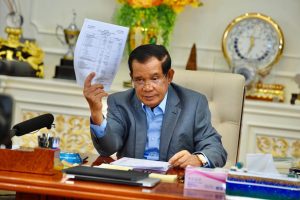Cambodian Prime Minister Hun Sen has ordered the country’s Ministry of Justice to study possible amendments to the country’s Constitution that would ban dual citizens from serving in the country’s top political posts. The suggested move would permit the country’s prime minister, and the presidents of the National Assembly, Senate, and Constitutional Council, to hold only Cambodian citizenship.
“In order to show loyalty to the nation and to avoid foreign interferences, the national leaders who serve as the president of the Senate, the president of the National Assembly, the prime minister and president of the Constitutional Council must have a single Cambodian citizenship,” Hun Sen wrote on his Facebook page yesterday, according to the government mouthpiece Fresh News.
The move came in rapid response to an erroneous report in The Guardian on October 4 that Hun Sen had recently purchased citizenship from the government of Cyprus. The article, part of the newspaper’s otherwise excellent coverage of the massive Pandora Papers document leak, referenced a Reuters special investigation from 2019 that found “some members of the Cambodian leader Hun Sen’s inner circle” had, along with sundry Saudi sheikhs and Russian oligarchs, purchased Cypriot passports.
But yesterday, the newspaper appended a correction stating that the initial version of the article had “incorrectly said that the Cambodian leader, Hun Sen, was among those who had received a Cypriot passport.”
Before the article could be corrected, however, the claim was picked up by exiled opposition leader Sam Rainsy, always on the lookout for ammunition to use in his three-decade-long struggle against Hun Sen’s government. In a Facebook post on Tuesday, he trumpeted the news to his 5 million-odd followers, following it with a post in which he called on the Cambodian people “to help accelerate Hun Sen’s departure following the dictator’s decision to buy a Cyprus passport.”
While the claim was later shown to be incorrect, the suggestion made some sense in light of the aforementioned Reuters report, which found that several members of Hun Sen’s inner circle had applied for or received Cypriot passports. These included the prime minister’s niece and her husband, who happens to be National Police Chief Neth Savoeun, Finance Minister Aun Pornmoniroth, and other tycoons closely linked to Hun Sen.
However, the erroneous report was revealing for the series of overreactions that it prompted in Phnom Penh. In addition to Hun Sen demanding a change to the Constitution, government lawyers put out a statement denying the report and the Ministry of Foreign Affairs wrote a letter to The Guardian complaining about its “grossly false and unacceptable claim.” Meanwhile, Justice Minister Koeut Rith and Foreign Minister Prak Sokhonn wrote to their Cypriot counterparts requesting that they look into the “false accusation” that Hun Sen had acquired a Cypriot passport.
Even Hun Sen’s son Hun Manet weighed in, claiming in a message on his Facebook page that senior politicians “must dare to sacrifice everything for the cause of the nation and the people of Cambodia, including renouncing the foreign citizenship.” In total, the government-aligned outlet Fresh News ran six articles on the report and the government’s various responses.
This knee-jerk reaction points to Rainsy’s continued ability to get under Hun Sen’s skin, even from exile, and the way in which a single erroneous newspaper report, like the proverbial beat of the butterfly’s wings, can set off serious political aftershocks in far-off Phnom Penh. It also suggests the sensitivity that attaches to questions of citizenship and loyalty in Cambodian politics.
For three decades, Hun Sen has accused his opponents, many of whom hold dual citizenship after fleeing Cambodia as refugees or exiles in the 1960s, 1970s, and 1980s, as having divided loyalties, and being ready to fly off to foreign bolt holes at the first sign of trouble. As he warned them in 1997, “Don’t say you are Khmer when it is easy and American when it is difficult.” Over the years, the Cambodian leader has also repeatedly threatened to ban politicians and party leaders from holding dual citizenship, though the ban has never been introduced, perhaps due to the likely international backlash.
For it to be revealed that Hun Sen had taken Cypriot citizenship would have demolished one of the primary pillars of his claim to political legitimacy. This alone made it necessary to dispel the claim beyond any doubt. As it stands, should the government proceed with the amendment, it would be easy enough to broaden it out in such a way that it prevents any of the present government’s opponents from holding any significant political position for the foreseeable future.

































